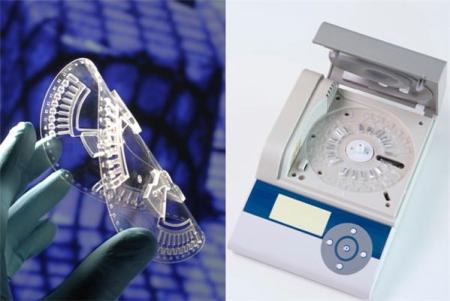Nov 22 2012
The Department of Microsystems Engineering of the University of Freiburg is Coordinating the Research Project DiscoGnosis
 Image Source: IMTEK/Bernd Mueller
Image Source: IMTEK/Bernd Mueller
An estimated 500 million people become infected with malaria each year. The disease is often lethal - particularly in tropical developing countries with insufficient health care services. The infected suffer from a high fever. As this is also the case with other germs, however, it is important to conduct a rapid and precise analysis to determine the cause of the disease for a successful therapy. A team of researchers aims to develop a rapid test of this kind within the context of the project DiscoGnosis. Launched in November 2012, the project will receive three million euros in funding from the European Union and is being coordinated by the Department of Microsystems Engineering (IMTEK) of the University of Freiburg.
DiscoGnosis stands for "disc-shaped point-of-care platform for infectious disease diagnosis" - a device that looks similar to a DVD player. Its purpose will be to purify patients' blood samples and detect all relevant fever-causing germs in a single step. The institutions responsible for the project want to develop an inexpensive method for determining whether a person with fever has malaria or not. Studies have shown that 30 to 40 percent of patients being treated for malaria are actually suffering from typhus or dengue fever.
Each disc will be intended for one use only and will be capable of making a reliable diagnosis automatically with the help of integrated biochemical analytical processes. The innovation thus has the potential to bring modern diagnostics to countries and regions with poor infrastructure and improve the health care of entire populations. Ultimately, it could serve as a shield to stop the spread of malaria in Europe, which is currently being exacerbated by climate change.
IMTEK's partners in the consortium are the University Medical Center Göttingen, the University Hospital Basel, Switzerland, the Swiss tool technology and engineering company Rohrer AG, the biotechnology companies MagnaMedics Diagnostics BV from the Netherlands and MAST Group Ltd. from Great Britain, and the European Foundation for Clinical Nanomedicine in Switzerland.